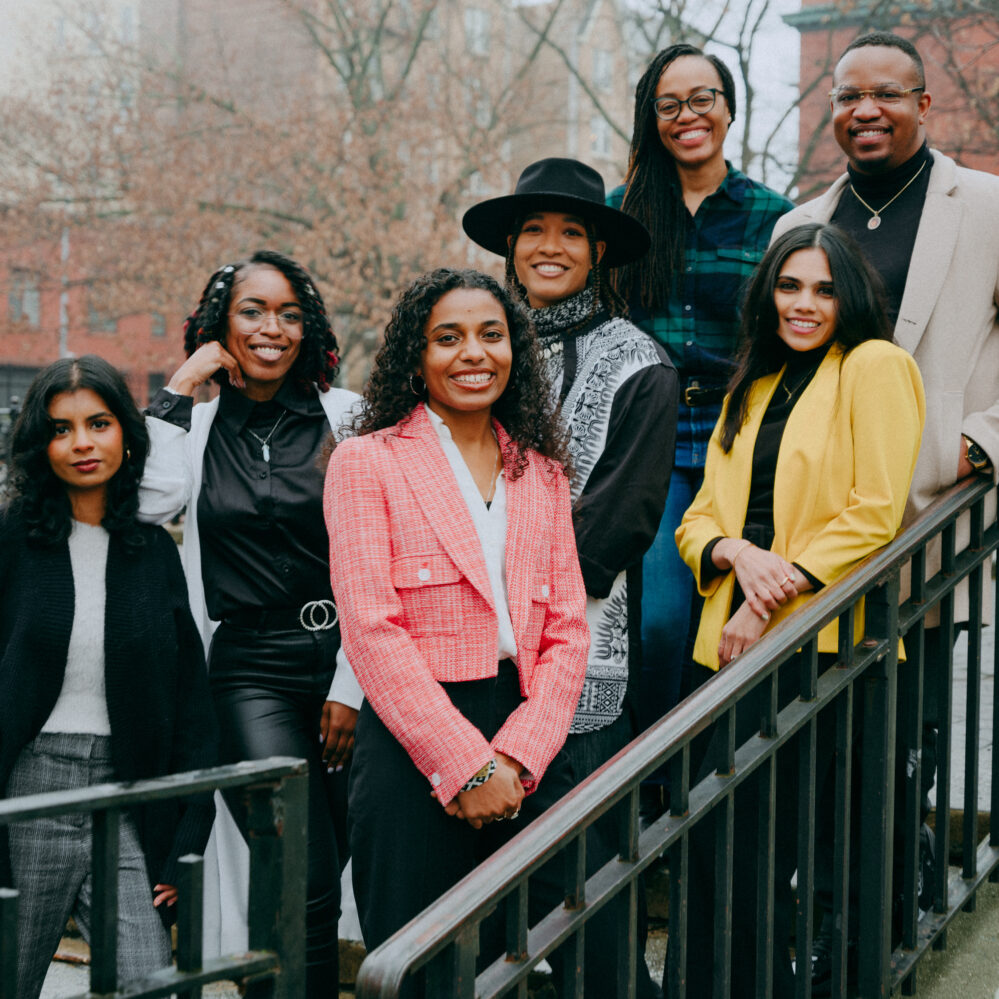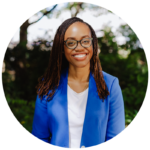Meet the New Next 100 Cohort
Launched in 2019, Next100 was designed to be intentionally different from traditional think tanks—a research and policy organization made up of those proximate to our country’s most pressing policy challenges.

Today, Next100, a startup think tank launched with the goal of changing the face of policymaking by diversifying the policy sector and centering impacted individuals and communities, announced its third cohort of seven ”Policy Entrepreneurs” (PEs). Next100 PEs will work full-time in New York City, driving policy change in and across the areas of climate, immigration, labor and antitrust, criminal justice, and housing.
Launched in 2019 by The Century Foundation (TCF), Next100 was designed to be intentionally different from traditional think tanks—a research and policy organization made up of those proximate to our country’s most pressing policy challenges, who would work alongside impacted communities to develop new solutions and approaches to meet those challenges. Next100 provides training and support to help emerging leaders translate their creative ideas into tangible policy change, piloting new approaches to policy development, advocacy, and talent development.
“Next 100 believes that those closest to the problem are also closest to the solution and we’re committed to connecting people to the tools they need to make those solutions a reality,” said Stefan Lallinger, executive director of Next100. “This cohort of incredibly talented PEs looks like America and has the lived experience with their issue areas to bring a fresh, humanizing perspective to it that the often stuffy, sterile policy making process so often lacks. We’re excited for this cohort to jump in and start making waves in their respective issue areas and their communities.”
Next100’s third class of Policy Entrepreneurs are:
 kier blake (Climate + Education): kier blake is a second-generation Jamaican organizer who is dedicated to disrupting the status quo in climate education. At Next100, kier will work to expand access to interdisciplinary, justice-centered climate education in New York’s K–12 schools. kier’s approach is informed by the lack of climate education they received learning in Los Angeles and while working in New York City schools, despite living in a community disproportionately impacted by climate change.
kier blake (Climate + Education): kier blake is a second-generation Jamaican organizer who is dedicated to disrupting the status quo in climate education. At Next100, kier will work to expand access to interdisciplinary, justice-centered climate education in New York’s K–12 schools. kier’s approach is informed by the lack of climate education they received learning in Los Angeles and while working in New York City schools, despite living in a community disproportionately impacted by climate change.
 Cheyanne Deopersaud (Housing + Foster Youth): Cheyanne is a fierce advocate for young people with child welfare involvement. At Next100, Cheyanne is developing innovative, sustainable solutions that address the root causes of housing instability among youth in, and transitioning out of, the foster care system. Her advocacy is fueled by her personal journey in foster care in New York, which has given her a profound understanding of the challenges and systemic barriers faced by youth in similar situations.
Cheyanne Deopersaud (Housing + Foster Youth): Cheyanne is a fierce advocate for young people with child welfare involvement. At Next100, Cheyanne is developing innovative, sustainable solutions that address the root causes of housing instability among youth in, and transitioning out of, the foster care system. Her advocacy is fueled by her personal journey in foster care in New York, which has given her a profound understanding of the challenges and systemic barriers faced by youth in similar situations.
 Sofie Fashana (Housing + Homelessness): Sofie is a tenacious advocate for foster youth and cash transfer programs, driven by a deep commitment to ensuring every young adult has their basic needs met. At Next100, her work centers around dismantling systems that dehumanize, and replacing them with initiatives that empower and uplift, especially for foster youth and the unhoused. Sofie’s personal experience with homelessness fuels her passion for policy change.
Sofie Fashana (Housing + Homelessness): Sofie is a tenacious advocate for foster youth and cash transfer programs, driven by a deep commitment to ensuring every young adult has their basic needs met. At Next100, her work centers around dismantling systems that dehumanize, and replacing them with initiatives that empower and uplift, especially for foster youth and the unhoused. Sofie’s personal experience with homelessness fuels her passion for policy change.
 Derrell Frazier (Criminal Justice): Derrell is an unwavering advocate for justice-impacted young people and emerging adults, an expert in criminal justice reform, and a champion for community transformation. At Next100, Derrell’s work focuses on removing barriers for young people in the justice system and decriminalizing poverty. As a justice-impacted individual and a child of incarcerated parents, Derrell is determined to shape a brighter, more just future for communities like the one he grew up in Baltimore.
Derrell Frazier (Criminal Justice): Derrell is an unwavering advocate for justice-impacted young people and emerging adults, an expert in criminal justice reform, and a champion for community transformation. At Next100, Derrell’s work focuses on removing barriers for young people in the justice system and decriminalizing poverty. As a justice-impacted individual and a child of incarcerated parents, Derrell is determined to shape a brighter, more just future for communities like the one he grew up in Baltimore.
 Rudrani Ghosh (Immigration): Rudrani is a storyteller and an advocate for migrant rights, hailing from the city of Kolkata, in India. At Next100, she focuses on increasing access to affordable and dignified housing for refugees and asylum seekers. Shaped by her experiences as a first-generation immigrant from a low income family, Rudrani also works to expand economic stability and educational resources for migrant communities.
Rudrani Ghosh (Immigration): Rudrani is a storyteller and an advocate for migrant rights, hailing from the city of Kolkata, in India. At Next100, she focuses on increasing access to affordable and dignified housing for refugees and asylum seekers. Shaped by her experiences as a first-generation immigrant from a low income family, Rudrani also works to expand economic stability and educational resources for migrant communities.
 Nia Johnson (Antitrust + Labor): Nia is a labor organizer and economic policy researcher who centers racial equity and intersectionality in her approach to policy development. At Next100, Nia works to increase labor bargaining power and uplift corporate accountability movements that center racial and social equity. Driven by her early exposure to the Occupy Oakland demonstrations and participation in the Fight for $15 campaign as a youth activist, Nia is unapologetically taking the fight to corporate villains and standing up for the workers left in their wake.
Nia Johnson (Antitrust + Labor): Nia is a labor organizer and economic policy researcher who centers racial equity and intersectionality in her approach to policy development. At Next100, Nia works to increase labor bargaining power and uplift corporate accountability movements that center racial and social equity. Driven by her early exposure to the Occupy Oakland demonstrations and participation in the Fight for $15 campaign as a youth activist, Nia is unapologetically taking the fight to corporate villains and standing up for the workers left in their wake.
 Chantal Hinds (Early Education): Chantal Hinds joins this cohort as a senior policy entrepreneur in a hybrid research and mentorship role. She will continue the critical work she championed in the second Next100 cohort on early education and foster care.
Chantal Hinds (Early Education): Chantal Hinds joins this cohort as a senior policy entrepreneur in a hybrid research and mentorship role. She will continue the critical work she championed in the second Next100 cohort on early education and foster care.
Like traditional think tanks, incoming PEs will conduct original and rigorous research and policy development, but they will do so in ways that are more creative, inclusive, and informed by the lived experiences of impacted communities. They will work closely with partner organizations and grassroots movements, and will embrace the power of social media, technology, and art to advance policy change. In addition to conducting research, Next100 will prioritize investing in and developing the skills of emerging leaders, helping to grow the progressive policy pipeline.
Next100 confronts cynicism and complaints about the government head on by trying to create a pool of diverse, talented progressive policy makers that look like America. In new polling done by Morning Consult with Next100:
- Only 1 in 4 Americans said they believe that government leaders “care about people like [them].”
- Just 3 in 10 adults think that “the government wants to hire people like them.”
- Half of young Americans are more likely to trust government leaders who are from their own communities.
“Elected officials across the country often lack lived experience with the issues they legislate on and it shows up in communities on the ground,” said Mark Zuckerman, TCF president and former deputy director of the Domestic Policy Council in the Obama administration. “Next100 is meant to be a counterweight to that, putting people directly impacted by policy in the driver’s seat of change. TCF and the country have benefited greatly from the contributions from the last two Next100 cohorts and I can’t wait to see what this cohort does to innovate and advance inclusive, equitable policy.”
For full bios of Next100’s new Policy Entrepreneurs, see here. To stay informed about Next100 and their work, subscribe here.

